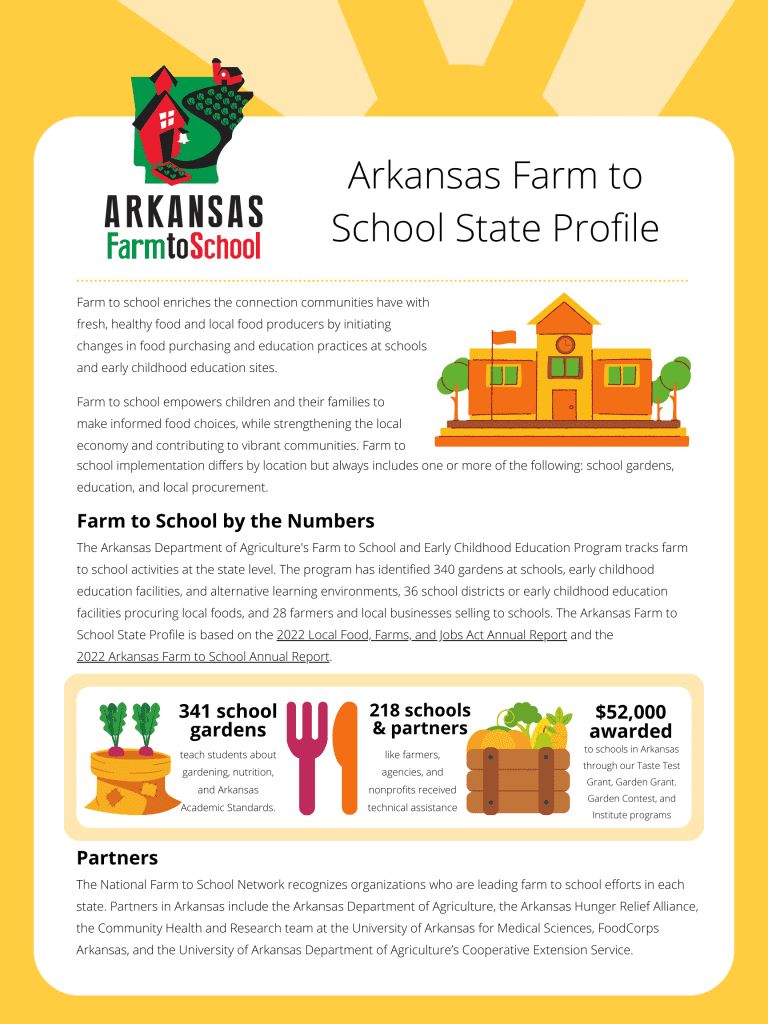Basics
The Basics of Farm to School
Farm to school enriches the connection communities have with fresh, healthy food and local food producers by initiating changes in food purchasing and education practices at schools, early childhood education centers, and alternative learning environments.
Students gain access to healthy, local foods as well as educational opportunities such as school gardens, cooking lessons, and farm field trips. Farm to school empowers children and their families to make informed food choices while strengthening the local economy and contributing to vibrant communities.
The pillars of farm to school are:
School Gardens: Students engage in hands-on learning through gardening and farming;
Education: Students participate in education activities related to agriculture, food, health, or nutrition; and
Procurement: Local foods are purchased, promoted, and served in the cafeteria or as a snack or taste test.
In the School Garden
Farm to school encourages the development of a school garden. From potted plants in a windowsill, to in-ground beds outside the school, school gardens provide students with opportunities for hands-on learning. School gardens can enhance lessons, connect to the state standards, and teach students life-long skills about food, agriculture, and nutrition.
In the Classroom
Farm to school provides a real-life context for learning across all Arkansas state standards such as science, math, language arts, social studies, art, music, and more. Engaging students in hands-on opportunities, such as planting school gardens, cooking food from scratch, and visiting local farms, establishes meaningful connections to the curriculum and deepens student understanding.
In the Cafeteria
Farm to school programs can incorporate local and seasonal foods into school meals, build school nutrition staff expertise through professional development, reduce waste, and make nutritious food accessible to all students. Activities like taste tests and cafeteria role modeling introduce students to new foods and empower them to make healthy choices.
Activities in Arkansas
The Arkansas Department of Agriculture’s Farm to School and Early Childhood Education Program tracks farm to school activities at the state level and has identified: 341 gardens at schools, early childhood education facilities, and alternative learning environments; 218 school and program partners receiving technical assistance, and $52,000 in Farm to School grants administered.
The Arkansas Farm to School State Profile is based on the 2022 Local Food, Farms, and Jobs Act Annual Report and the 2022 Arkansas Farm to School Annual Report.
Federal Farm to School Grantees
- 2021 Arkansas Department of Agriculture $97,915 (USDA), Healthy Flavors Arkansas $99,996 (USDA), and the Fayetteville School District $82,251 (USDA);
- 2020 Carroll County Resource Council $50,000 (USDA), Springdale School District $20,000 (USDA), and the University of Arkansas System Division of Agriculture Cooperative Extension Service $83,688 (CDC);
- 2018 Conway School District $96,779 (USDA);
- 2017 Arkansas Department of Agriculture $31,381 (USDA);
- 2016 Conway School District $44,927 (USDA) and Winrock International $47,646 (USDA);
- 2015 Arkansas Children’s Research Institute $49,918 (USDA) and Lawrence County School District $100,000 (USDA);
- 2014 Mansfield School District $32,721 (USDA); and
- 2013 Fayetteville School District $99,779 (USDA) and Lawrence County School District $45,000 (USDA).

